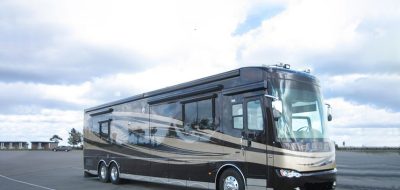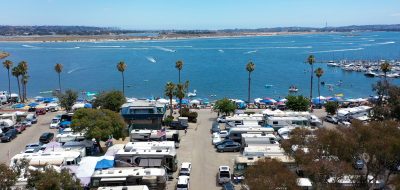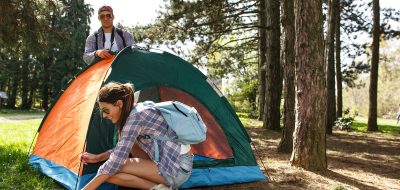Hi, folks. This month we’ll talk about bearings, generators, long term parking, water heaters and tire problems. Remember, you can submit your RVing questions to [email protected]. Happy Trails!
—————————————
Mark:
How often should you repack your wheel bearings on a travel trailer? I am hearing once a year. Is this correct? I can do myself but was wondering is there a video or something that can walk a person through this, as taking it to an RV dealer is rather expensive yearly. Thanks, Nolan
Hi, Nolan:
If your trailer is only used a few weekends a year and is never submerged in water (like a boat trailer), you can probably go quite a bit longer than one year before you need to worry too much about repacking the bearings. If you travel extensively, the one-year interval is actually a good idea. Even if the bearings are fine, pulling the hub and drum allows you to inspect the brake components for wear. Repacking bearings is not really all that difficult, but it can be really messy! Basically, you need to raise the wheel off the ground, remove it, and then remove the hub/brake drum assembly to gain access to the bearings. Check out http://www.etrailer.com/faq-wheelbearingpack.aspx for a step-by-step guide. There are also a number of videos available in their Help section. When reassembling the hub, it is important to properly set the preload on the bearings and then replace the nut retainer and/or cotter pin to keep everything together. You should also adjust and test the brakes after everything is back together. Like any other repair project, if you feel it might be beyond your capabilities, please take it to a service facility and have a qualified tech do the work.
———————————————
Hi, Mark:
My generator runs fine at low elevation, but when I go to higher elevations, it won’t run properly. I’ve adjusted the elevation level thing on the carburetor, but sometimes it won’t stay running. Can you explain why? Thanks, Ralph
Hi, Ralph:
Several possibilities come to mind. When you operate carbureted engines at high altitude, there is essentially less air density, so they tend to run rich. The altitude adjustment on your generator is designed to manually compensate for that effect by allowing you to lean out the fuel mixture. However, if your generator carburetor is not in good adjustment or is gummed up with fuel deposits or sludge, the altitude adjustment may not be effective. That’s why it is so important to exercise the generator at least once a month, under load, for at least 30 minutes. This exercise is needed to keep the fuel system clean and everything limbered up. Another possibility is that you are inadvertently overloading your generator when you are at high altitude by expecting it to run everything as well as it does “down below.” Your generator can’t operate the same AC load at high altitude that it can at sea level. Most engines lose about 3-4 percent of their rated horsepower per each 1,000-foot increase in altitude. At 6,000 feet, that could reduce your generator’s horsepower by as much as 20 percent! Your generator operator’s manual will have a chart that specifies how much the unit should be de-rated for increases in operating altitude.
——————————————–
Dear Mark:
I have moved my Alfa Gold, 35-ft. 5th-wheel with 2 slide-outs, to a park and plan to live in it for a few years. I live alone and can do a lot of the maintenance things myself but will definitely need help with anything up on the roof. I will not be moving the trailer in and out of my space. I have covers for the wheels and plan to use heavy-duty jacks to stabilize the trailer in four places. What I need to know is: Are the jacks a good idea and, if yes, exactly where should they be placed? Also, how large and what kind of a weight distribution pad should I have between the jack and trailer bottom? Is there additional maintenance required for a trailer that stays in place? Thanks for any info you can provide. Nancy
Hi, Nancy:
You can certainly use jacks if you wish; just be sure that the jacks are positioned so that the lift is applied only to the trailer’s frame. If desired, you can use a block of pressure-treated wood between the jack and the frame. Do not try to support the trailer by any part of the body, as it’s not strong enough. Since you have a 5th-wheel, I strongly suggest that you consider a 5th-wheel stabilizer tripod for the front of the rig. Here’s an example of what I’m referring to:
http://www.pplmotorhomes.com/parts/rv-jacks/stabilizer-jacks-5th-wheel.htm
Using one of these stabilizers will significantly reduce sway and bounce, and if your rig also has standard stabilizing jacks on the rear, you may not need any additional jacks. As far as additional maintenance goes, there’s really not a lot you would need to do with a parked trailer. Keep the tires covered and inflated, keep up with roof maintenance, and continue to keep the black-tank valve closed at all times, dumping the tank only when it is nearly full.
————————————————-
Hi:
We have an older 2000 travel trailer with a Suburban 6-gallon water heater. It is one that does not have an automatic ignition, so we have to light the pilot whenever we need hot water. The problem is when the burner ignites; it causes a small “explosion” and sometimes blows out the pilot. Of course, it then needs to be re-lit. This occurs only intermittently when the main burner ignites and does not seem to be dependent on wind or weather. I have noticed no gas smell inside or outside. The gas system has been leak- and pressure-tested and a new regulator installed, but no joy. Any ideas? Ron
Hi, Ron:
Most water heater pops and explosions are caused by a delay in igniting the main burner when gas starts to flow. When the main burner valve opens and ignition is delayed, propane can collect in the combustion tube and create a pop or bang when it is finally ignited. This problem is more common with DSI heaters, the ones that use an electric spark to light the burner. I suggest that you inspect the burner, burner tube, and combustion chamber to be sure there are no obstructions. Spiders and mud daubers’ nests in any of these areas can cause erratic operation. Also, make sure that the pilot flame is at least ½” long and is blue and conical in shape. If the pilot is too low or weak, it may not properly ignite the main burner. If the pilot looks wrong or if the heater continues to act up, have a qualified technician take a look at it. There could be a problem with the gas control valve or pilot valve.
————————————-
Mark:
I have a 2007 18-ft. travel trailer that runs with only two tires. I have towed it only 4,000 miles and had a flat tire twice. The trailer originally came with ST185 tires and now wears ST175 tires. What would be the best way to prevent frequent flat tires? Masako
Hi, Masako:
It’s critical to know what your trailer weighs! You need to take the trailer, with all of the items you would normally carry onboard, to a scale and weigh it. Once you know how much weight is on your tires, check the sidewall weight rating to be sure that the tires are rated to carry the load. You can check the RV’s rating plate, owner’s manual, or other documentation to see what tires the manufacturer recommends, but knowing your weight is the most important piece to the puzzle. Proper inflation is also a key element for tire life. The proper inflation pressure for any tire is actually determined by the weight it is carrying, and the “max pressure” is often not the best operating pressure. Most tire manufacturers have pressure charts that provide this information on their websites, usually referred to as load/inflation tables. However, you’ll need to know the actual weight each wheel is carrying on your rig in order to use these tables. The best way to get that information is usually at an RV rally where individual wheel weighing is being offered. There are several groups offering this specialized weighing, one is the Escapees SmartWeigh program www.escapees.com/smartweigh Be sure to check your tire pressure before the start of each trip and each morning before you hit the road while traveling. Once you have the correct tires for the load and keep them properly inflated, your tire problems should be minimized.
————————————————————————————
Do you have a question for Mark? Please submit your question via email to [email protected].
Please remember, material will be edited. Because of the large volume of material and correspondence submitted, individual replies will be limited to questions that are chosen for publication.
Founded in 1978, the Escapees RV Club provides a total support network for RVers that includes a wide variety of opportunities for fun, adventure, and education.
MAIL SERVICE The best mail–forwarding service in the country. Members can personalize their mail delivery receiving only the mail they want when they want. MAGAZINE Award-winning magazine written for RVers by RVers.
CHAPTERS There are 51 chapters across the U.S., Canada, and Mexico that offer local luncheons and rallies within 150 miles of home.
HOPs Theme–related outings and adventures held across the country.
ESCAPADES Five–day educational events that offer over 60 seminars and workshops to educate, entertain, and enhance the RV lifestyle.
PARKS Our discount park system offers a variety parking options. PLUS MUCH MORE!
A complete listing of all Escapees events and a comprehensive list of member benefits are found at www.escapees.com.








